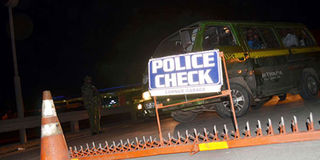Withdrawal of alcoblow ends police bosses' income from bribes

Police use alcoblow breathalyser gadgets to crackdown on drink-driving, at Nyali bridge in Mombasa on October 13, 2014. They were extorting motorists under the guise of preventing the vice. PHOTO | FILE | NATION MEDIA GROUP
What you need to know:
- Judge Matheka said that under the law, police have to prove, beyond the Alcoblow marks, that motorists they arrest over drink-driving are “too intoxicated to control a vehicle”.
- The roadblocks are supposed to be set up with the direction of the traffic police headquarters and implemented by the individual police divisions, but that rarely happens.
Police stations in Nairobi, Mombasa and Kisumu were making more than Sh2 million a night after extorting drunk drivers.
The amount was shared by the bosses, leading to an all-out war for the bribe money, and ultimately forcing the government to withdraw Alcoblow gadgets from the roads.
For the past two weekends, motorists in Nairobi going home after a night of merrymaking have been driving without the fear of meeting roadblocks, police officers looking for any hint of alcohol on their breaths, waiting lorries and breakdown vehicles.
This had become the norm on city roads on weekends since President Uhuru Kenyatta in December last year ordered the National Transport and Safety Authority (NTSA) to leave law enforcement to the police and concentrate on policymaking.
EXTORTION RACKETS
Since its inception in 2012, NTSA had made the breathalyser, commonly known as Alcoblow, it’s most conspicuous way of cementing its authority despite several judgments from courts questioning the legality of the gadget, which was first introduced that year.
The most recent such judgment was made in March by Justice Mumbua Matheka, who said that under the law, police have to prove, beyond the Alcoblow marks, that motorists they arrest over drink-driving are “too intoxicated to control a vehicle”.
“Merely having alcohol in your system is not an offence. The offence crystallises when you cannot control the vehicle you are driving,” said the judge as she quashed an earlier ruling by a lower court that had fined motorist George Wambugu Sh100,000 for driving while drunk.
Section 44(1) of the Traffic Act says that those found driving under the influence are liable to pay between Sh20,000 and Sh50,000 if found guilty.
But the lengthy legal processes, spending the night in a cell and being charged in court for an embarrassing crime has over the past one year made motorists vulnerable to well-organised police extortion rackets.
BOSSES' GREED
The Nation established that almost all of those arrested for drink-driving are never booked in the Occurrence Book (OB).
The roadblocks are supposed to be set up with the direction of the traffic police headquarters and implemented by the individual police divisions, but that rarely happens.
Police bosses have been sending teams to roads with the aim of arresting as many motorists as they can and force them to buy their freedom.
This can be done immediately at the roadblock for as low as Sh2,000, but once you reach the station, the price shoots up to between Sh20,000 and Sh30,000. Another Sh10,000 is added as “towing costs”.
Arresting 50 drivers a night would earn the officers Sh1.5 million, and insiders say this huge amount of money had started creating divisions among police bosses.
Insiders say the disputes were mainly between sub-county commanders and the traffic division on how to split the money.
INVESTIGATIONS
It is said that some sub-county commanders were not being transparent on the number of people arrested per night and the Traffic Department started pushing for total control of roadblocks.
Officers guarding roadblocks took advantage of the situation and started charging their own levies before releasing people, leading to an all-out scramble for cash and unnecessary harassment of motorists.
The most notorious checks were at Roasters, on Thika road; Waiyaki Way, just outside the University of Nairobi; Lang'ata Road, and Uhuru Highway.
When the complaints became too much, senior officers at Vigilance House decided to investigate, and while undercover on November 16, they were shocked at the level of corruption at the Alcoblow checks.
All sub-county commanders were ordered to return breathalyser kits in their jurisdictions to traffic headquarters until further notice.
It is not clear when they will make a comeback, but sources have told us they may be handed back to NTSA.
Policymakers at the agency are said to be thinking about bringing back the gadgets just before Christmas.
But Nairobi traffic police commander Joshua Omukata insisted that the Alcoblow gadgets are still on the road.





